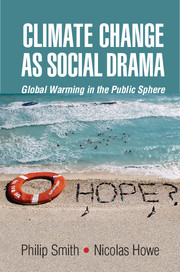Book contents
- Frontmatter
- Contents
- Acknowledgments
- 1 Introduction: The Problem of Climate Change
- 2 Climate Change as Social Drama
- 3 Narrating Global Warming
- 4 An Inconvenient Truth: The Power of Ethos
- 5 Climate Change Art: An Illustrative Failure?
- 6 Climategate and Other Controversies
- 7 The Climate Conference as Theatre
- 8 Local Dramas: The Places of Climate Change
- 9 Conclusion: The Show Must Go On
- References
- Index
8 - Local Dramas: The Places of Climate Change
Published online by Cambridge University Press: 05 May 2015
- Frontmatter
- Contents
- Acknowledgments
- 1 Introduction: The Problem of Climate Change
- 2 Climate Change as Social Drama
- 3 Narrating Global Warming
- 4 An Inconvenient Truth: The Power of Ethos
- 5 Climate Change Art: An Illustrative Failure?
- 6 Climategate and Other Controversies
- 7 The Climate Conference as Theatre
- 8 Local Dramas: The Places of Climate Change
- 9 Conclusion: The Show Must Go On
- References
- Index
Summary
For a philosopher who wrote brilliantly on the general concept of place (Casey 1997; Curry 1996), Aristotle had amazingly little to say about the fact that every story must happen “somewhere.” The Greek tragedies and comedies that he studied were located in kingdoms, cities, islands, deserts, temples, and so forth. These settings might be expected to influence mood or audience interpretations due to their aesthetic properties or the background myths of place with which they are associated. Exploiting these is a common principle of contemporary staging in theatre, film, and opera. Regrettably Aristotle remains silent. His interest in the relationship of plot and character reigns supreme in the Poetics. As in our chapter on climate change art, we ask here whether his focused attention on these variables is analytically or pragmatically sufficient. Might not some attention to the settings of action pay some dividends? Might place have implications for the social drama of climate change with much the same force as character? We begin our chapter by mapping and justifying this theoretical possibility. We end it with some empirical investigations of the ways that settings are imbricated with plot and character in the telling of particular climate change dramas.
In their darker hours, environmentalists often say that apathetic members of affluent societies will only take climate change seriously when it starts to “hit home” – when they and their families and friends start to suffer from unmistakable, localized changes: wells running dry, neighborhoods lost to the sea, crops failing year after year. As long as she sees it as somebody else's problem, the argument goes, the average member of the middle class will find other issues to worry about. In more optimistic moments, the same environmentalists tell a different version of this story. Individuals, they say, will band together to fight climate change when they feel they are fighting for home, when concrete, meaningful place – not abstract, global space – becomes the focus of their shared concern.
- Type
- Chapter
- Information
- Climate Change as Social DramaGlobal Warming in the Public Sphere, pp. 166 - 190Publisher: Cambridge University PressPrint publication year: 2015

